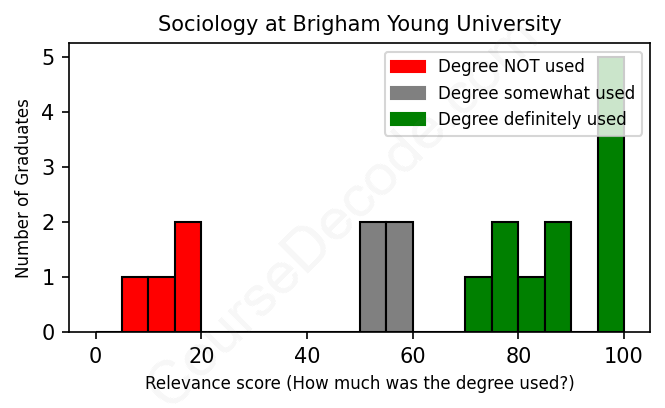
First, some facts. Of the Sociology graduates from Brigham Young University we've analyzed , here's how many have used (or NOT used) their degree in their career:

These are estimates based on AI analysis of 19 LinkedIn profiles (see below).
The verdict? Slightly below average. Overall, with an average relevance score of 65%, Sociology graduates from Brigham Young University have a slightly lower likelihood (-2%) of finding work in this field compared to the average graduate across all fields:
And for comparison, here's the chart for all profiles we've looked at across all degrees.
Also, after graduating, 57% of these graduates have pursued further education other than another Bachelor's degree (such as a Masters degree or other), compared to the average across all profiles of 35%. This suggests you may need more than just a Bachelors degree to be competitive as a Sociology graduate.
See the details:
|
Relevance score: 97% We think this person has gone into a career highly relevant to their degree. We think this person has gone into a career highly relevant to their degree.
DEGREE INFOGraduated in 2010 from Brigham Young University with a Bachelor of Science (BS) in Sociology. Also pursued further education since (see below). JOB HISTORY SINCE GRADUATIONTeam Lead and Project Manager The Academy for Creating Enterprise Jan 2013 - Sep 2013 Projects Director  The Grantwell Program Aug 2013 - May 2014 Graduate Research Assistant  Brigham Young University Sep 2013 - May 2014 Senior Research Manager  The Social Research Institute at the University of Utah - Employment Jun 2014 - Present FURTHER DEGREES DONE SINCE GRADUATINGMaster's DegreeBrigham Young University 2012 - 2014 ABOUTNo information provided. |
The top 10 most common jobs done by the graduates we've analyzed (ranked most common to least) are:
Here is a visual representation of the most common words in job titles for Sociology graduates (this is across all Sociology graduates we've analyzed, not just those who went to Brigham Young University):

Looking at the career trajectories of graduates from Brigham Young University's Sociology program, it's clear that many take varied paths after graduating. For most, their first jobs seem to be in related fields like research, non-profit work, or assistance roles, often involving a blend of social engagement and organizational skills. For instance, many have started with internships or project management roles, which help them gain experience and build a professional network. It’s quite common to see these early roles evolve into positions where they can influence policies or manage programs, especially in social services, education, or community-driven organizations.
Fast forward five to ten years down the line, and you can see a mix of trajectories. While some graduates have advanced to senior roles in areas like social research or human resources, others have shifted towards completely different industries, such as marketing or tech. There are definitely success stories where individuals secure impactful positions like Senior Analysts and Health Educators shortly after graduation, but there are also those whose paths are less aligned with their sociology degree, veering into administrative or support roles. Overall, it appears that while many sociology graduates find fulfilling careers relevant to their studies, there is a fair share who may end up in jobs that don't utilize their degree to its full potential. So, while sociology can lead to meaningful work, it’s also a bit of a mixed bag when it comes to career outcomes for these grads.
Honestly, a Bachelor’s degree in Sociology can be pretty manageable, especially if you're genuinely interested in the subject. At Brigham Young University, like many places, the coursework typically involves a mix of reading, writing, and some critical analysis, so it’s definitely not a walk in the park, but it's not the most cutthroat major either. You’ll dive into topics like social behavior, institutions, and cultural trends, which can be really fascinating if you’re into understanding how society functions. You might find it easier if you enjoy discussions and group projects, but if that's not your vibe, it could feel a bit tougher. Overall, for a college degree, it strikes a decent balance of challenge and interest, making it feel more accessible than some other majors.
Most commonly, in the LinkedIn profiles we've looked at, it takes people 4 years to finish a Bachelor degree in Sociology.
Looking at these sociology graduates from Brigham Young University and their career paths, it seems like they've had a pretty mixed bag when it comes to making decent money. A few of them have landed senior roles or positions in government organizations, which typically offer better pay and job security, suggesting they’re doing alright financially. On the flip side, many have held positions like interns or support roles early in their careers, which usually don't pay that well. So, while some are likely to be doing better than others, overall, it looks like they've found success in different ways, and their salary levels probably vary a lot from one individual to another.
Here is a visual representation of the most common words seen in the "about" section of LinkedIn profiles who have a Bachelor degree in Sociology (this is across all Sociology graduates we've analyzed, not just those who went to Brigham Young University). This may or may not be useful:

Here are all colleges offering a Bachelor degree in Sociology (ordered by the average relevance score of their Sociology graduates, best to worst) where we have analyzed at least 10 of their graduates: